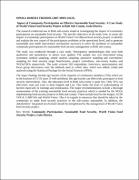| dc.description.abstract | OPOKA ROBERT FREDDIE (2007-M093-10125)
Impact of Community Participation on Effective Sustainable Food Security: A Case Study of World Vision Food Security Project in Bobi Sub-County, Gulu District.
The research conducted was in Bobi sub-county aimed at investigating the impact of community participation on sustainable food security. The specific objectives of the study were: to assess the impact of community participation on World Vision‟s livelihood food security project, to identify and explain the root causes of the participatory problems at the operational level, and to generate sustainable and viable intervention mechanisms necessary to solve the problems of sustainable community participation for sustainable food security management in Bobi sub-county.
The study was conducted through a case study. Participatory methodologies that were both qualitative and quantitative in nature were applied. The sample size was determined using systematic random sampling, simple random sampling, purposive sampling and convenience sampling for food security target beneficiaries, project committees, sub-county leaders and NGOs/CBOs respectively. The study covered 182 respondents. Interviews, questionnaires and focus group discussions were the methods used to collect data, which was edited, coded and analysed using the Statistical Package for the Social Sciences (SPSS).
The major findings include age bracket of the majority of community members (72%) which are in the brackets of 15-35 years. If well mobilised, this age bracket can effectively participate in food security interventions. Also, the education level in Bobi sub-county is quite low. Only 31% can effectively read and write in both English and Luo. This limits the level of understanding of farmers especially in trainings and sensitisation. The major recommendations include a thorough reassessment of the existing sustainable food security practices which is needed by the NGOs implementing food security projects in Bobi sub-county. These include food for the hungry, ACDI VOCA, CARITAS and World Vision. This is in regards to measures that should be taken by the community to make food security practices in the sub-county sustainable. In addition, the stakeholders‟ integrated involvement should be strengthened by the management of World Vision food security project.
Key Words: Community Participation, Sustainable Food Security, World Vision Food Security Project, Gulu District. | en_US |


